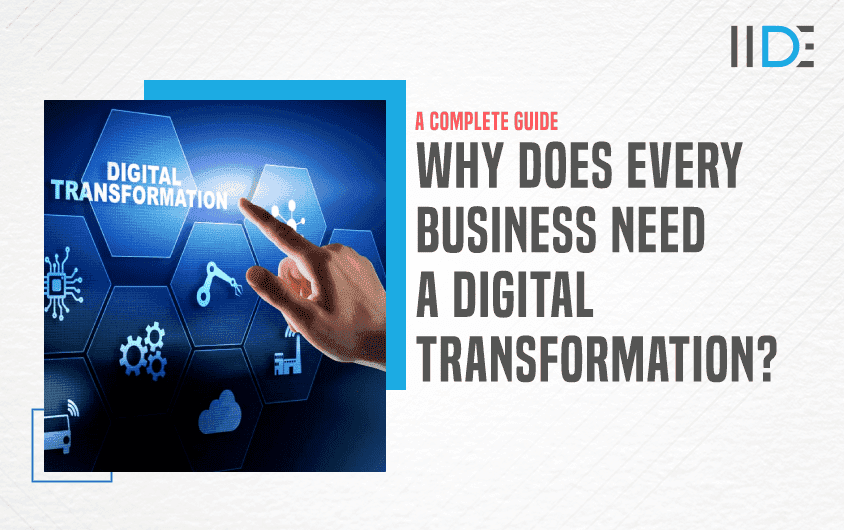
Orginally Written by Karan Shah
Updated on Oct 11, 2025
Share on:
Digital transformation for business involves integrating digital technology into all areas and improving processes and customer experiences. Studies show that 70% of companies have accelerated digital transformation due to the pandemic. As digital transformation investments in India are expected to exceed INR 6 lakh crore by 2025, companies must adopt these strategies to remain competitive and future-ready.
In today’s world, businesses must realise that they must use digital channels to engage with their key stakeholders. It is necessary to maintain relevance and drive the conversation necessitating the need for digital transformation for business.
In their latest Digital Transformation report, The World Economic Forum said, “To succeed in the digital era, (companies) will need to become digital enterprises, rethinking every aspect of their businesses.” A lot of companies have already started doing that. They are trying to automate and streamline their business processes.
They have begun to understand the utility of artificial intelligence and machine learning and are ready to invest in them to adapt them to their business needs. They have also realised the power of digital marketing and have started to leverage the reach it provides to target their potential customers.
According to Gartner, of 15 industries around the globe, 47% of CEOs have been asked by their boards of directors to move towards digital business. 56% said that their profits increased when they made digital improvements. It shows that almost every industry has understood the need for digital transformation and has started adapting.
After understanding the importance of digital transformation for business, many entrepreneurs want to leverage the power of digital transformation to reach the pinnacle of success. This has encouraged them to enrol for a PG in digital marketing.
Importance of Digital Transformation in Business

Source: Google
In today’s dynamic business landscape, digital transformation in business is important for staying ahead, aligning processes with evolving technology, and meeting heightened customer expectations. Investing in digital strategies not only ensures competitiveness but also promises long-term returns, positioning businesses for sustained success in the digital era. Here are four reasons why is digital transformation important:
1. Rapidly Changing Pace of Digital Technology
Technology is changing fast. Every business has to cope with this changing business environment and adapt to these innovations. The processes and strategies that worked before are, most likely, not going to work today, increasing the need for digital transformation for business.
If any company wants to survive in this digital age, it requires an alignment of all six layers: process, platform, people, product, marketing, and customer experience. If any of these are not aligned with the digital revolution, then the business is bound to suffer.
After understanding the need for digital transformation for business, many entrepreneurs seek digital marketing classes to learn and leverage these skills to boost their ROI.
2. Evolving Customer Expectations
Customer expectations are growing, and every business is trying hard to keep up with them. Today it is far easier than ever before for consumers to explore alternatives to meet their needs. That is why each company has to make extra efforts to ensure their customers stay with them. It will be possible only if the company understands the importance of digital transformation to help it meet it’s customer expectations.
Many aspirants enrol for a free digital marketing masterclass to learn and explore various industry offerings.
3. Staying Ahead of the Competition
Businesses can lead, thanks to a shift in technology and capability that was not there even five years ago. If they do not align with this shift even after understanding the importance of digital transformation for business, they are definitely going to lag behind their competitors. If a company does not adopt digital transformations, someone else will.
Many entrepreneurs study digital marketing online to pursue their upskilling plans and use them to stay ahead of the competition.
4. Long Term Returns
Digital Transformation in business might take a lot of investment in terms of money, training of the workforce and revamping existing organisational procedures, but once this is achieved, the returns will be long-term.
According to IDC, global spending on digital transformation technologies is projected to reach $2.8 trillion by 2025, more than double the amount allocated in 2020. Businesses will allocate 10% of their revenue to plan and implement their digital strategies. It shows that digital transformation in business is being recognised as a long-term investment.
If your company wants to reap the long-term benefits that come with adopting digital technologies, then a digital transformation in business is a must. A new kind of customer requires a new way of doing business. Most companies today are moving ahead with digital transformation initiatives, and so should you.
Do you find this article insightful? Check out our digital marketing blogs now!
Key Components That Bring Digital Transformation to Business

Source: Google
Digital transformation involves the use of various components that can be used to modernise a business. Understanding these key components is essential for successfully implementing digital transformation in business.
1. Technology Integration
The backbone of digital transformation is the integration of new technologies into existing business processes. This includes adopting cloud computing, AI, machine learning, and IoT to streamline operations and enhance decision-making.
Students across the country, especially the ones residing in Bangalore believe that data science is one of the best technological developments that can help in reading vast amounts of data easily. This has led to an increase in demand for data science courses in Bangalore.
2. Data-Driven Decision Making
Data plays a crucial role in bringing digital transformation to business. Businesses must leverage data analytics to derive valuable insights, predict trends, and make informed decisions. This shift towards data-driven strategies is a significant factor in understanding why digital transformation is important.
Many people look for the best online marketing courses to ensure they can bring digital transformation to business and take their game a notch above.
3. Customer-Centric Approach
The need for digital transformation for business often arises from the changing expectations of customers. Businesses must prioritise a customer-centric approach, utilising digital tools to personalise experiences, improve customer service, and build long-term relationships.
Many businesses across the world, particularly the ones operating in Los Angeles, are looking to create strategies tailored to their target audience. To achieve this, they look for the best digital marketing agencies in Los Angeles.
4. Workforce Empowerment
Digital transformation for business also involves equipping the workforce with the necessary tools and training to adapt to new technologies. This not only enhances productivity but also ensures that employees are aligned with the organisation’s digital goals.
Digital Transformation Strategies for Business Success

Source: Google
Developing a robust digital transformation strategy is crucial for achieving business success. Here’s how businesses can create effective strategies that cater to their unique needs.
1. Assessing Current Capabilities
Before implementing digital transformation in business, they must assess their current technological and operational capabilities. Understanding the starting point helps in identifying gaps and planning the digital transformation for the business environment accordingly.
2. Setting Clear Objectives
Clear, measurable objectives are vital to any digital transformation strategy. These objectives should align with the overall business goals and address specific challenges, emphasising the importance of digital transformation in business growth.
Many marketing aspirants enrol in free top-paying skills courses to learn the skills that can help them bag high-paying jobs in their dream companies.
3. Building a Roadmap
A well-defined roadmap outlines the steps necessary to achieve digital transformation. This includes timelines, resource allocation, and milestones that guide the process, ensuring that the importance of digital transformation in business is consistently upheld.
4. Continuous Monitoring and Adaptation
The digital landscape is ever-evolving, so businesses must continuously monitor their progress and tailor their strategies as needed. This flexibility is key to sustaining the importance of digital transformation over time.
Would you like to learn how companies use an array of platforms to create their marketing strategies? Have a look at our digital marketing case studies now!
Challenges in Implementing Digital Transformation for Business\
While digital transformation in business offers numerous benefits, it also introduces several challenges that businesses need to address to succeed.
1. Resistance to Change
One of the major hurdles to digital transformation is resistance from employees accustomed to traditional processes. Addressing this resistance requires effective change management and clear communication about why digital transformation is important.
2. High Initial Costs
Implementing digital transformation for business can be expensive, with significant upfront costs for new technologies and training. Businesses need to view these costs as an investment in their future and understand the importance of digital transformation in staying competitive.
Entrepreneurs, especially the ones running their enterprises in Mumbai and Faridabad, today understand the need for digital transformation in business. For this reason, they make sure that their employees enrol in the best digital marketing courses in mumbai and digital marketing courses in faridabad, respectively.
3. Data Security Concerns
As businesses transition to digital platforms, data security becomes a critical concern. Safeguarding sensitive data and ensuring adherence to regulations are essential components that necessitate the need for digital transformation.
4. Integration Issues
Integrating new digital tools with existing systems can be complex and time-consuming. Proper planning and the right technology partners are necessary to overcome these integration challenges.
Talking about challenges, video marketing has evolved over the years giving rise to new opportunities and challenges. Read this blog on video marketing trends to learn to how businesses can use Video elements to take their campaigns a notch above.
Future Trends in Digital Transformation

Source: Google
Understanding future trends in digital transformation helps businesses stay ahead of the curve and continuously innovate.
1. Artificial Intelligence and Automation
AI and automation are poised to play an even bigger role in the future of digital transformation in business. These technologies will drive efficiency, reduce costs, and open new opportunities for innovation.
2. Enhanced Customer Experiences
The importance of digital transformation will increasingly focus on creating seamless, personalised customer experiences. Businesses that can predict and fulfill customer needs through digital channels will gain a significant competitive advantage.
There are various channels or mediums through which a user can access a customer’s product or service. Read this blog on Omnichannel Marketing Strategies to learn how to create marketing strategies across various platforms and how they can help enhance user experience.
3. Sustainable Practices
Sustainability is becoming a major consideration in digital transformation strategies. Businesses are looking for ways to reduce their environmental impact through digital solutions, highlighting the need for digital transformation that aligns with global sustainability goals.
4. Expanding Digital Ecosystems
As businesses continue to digitise, the ecosystem of interconnected digital tools and platforms will expand. This trend underscores the importance of digital transformation in business and the necessity for businesses to remain agile and adaptive.
Businesses across India, especially the ones operating in Vashi want to understand the effect of trends and how they can bring digital transformation in business. This has encouraged me to look for digital marketing courses in vashi.


Learn Digital Marketing for FREE


Want to Know Why 2,50,000+ Students Trust Us?
Dive into the numbers that make us the #1 choice for career success

MBA - Level
Post Graduate in Digital Marketing & Strategy
Best For
Fresh Graduates
Mode of Learning
On Campus (Mumbai & Delhi)
Starts from
Mar 23, 2026
Duration
11 Months
Live & Online
Advanced Online Digital Marketing Course
Best For
Working Professionals
Mode of Learning
Online
Starts from
Mar 6, 2026
Duration
4-6 Months

Online
Professional Certification in AI Strategy
Best For
AI Enthusiasts
Mode of Learning
Online
Duration
5 Months

Offline
Undergraduate Program in Digital Business & Entrepreneurship
Best For
12th Passouts
Mode of Learning
On Campus (Mumbai)
Duration
3 Years
Recent Post
Digital Marketing Courses Nearby
You May Also Like
Digital transformation in business refers to the process of integrating digital technologies into all areas of an organisation, fundamentally changing how it operates and delivers value to customers. The importance of digital transformation lies in its ability to improve efficiency, enhance customer experiences, and drive innovation. Businesses that embrace digital transformation can stay competitive and responsive to market changes.
The importance of digital transformation is multifaceted. It allows businesses to streamline operations, leverage data for informed decision-making, and meet evolving customer expectations. As technology advances, companies that invest in digital transformation are better positioned to adapt, innovate, and achieve long-term success.
Key components of digital transformation for business include technology integration, data-driven decision-making, a customer-centric approach, and workforce empowerment. These elements work together to modernise business processes and align with the digital transformation in the business environment.
The need for digital transformation drives businesses to rethink their strategies and processes. By recognising the importance of digital transformation, companies can develop strategies that leverage digital tools and technologies to boost operational efficiency, improve customer engagement, and gain a competitive advantage.
Implementing digital transformation can present challenges such as resistance to change, high initial costs, data security concerns, and integration issues. Addressing these challenges is crucial for successfully achieving digital transformation in business and ensuring the investment yields positive returns.
Future trends in digital transformation include the increased use of artificial intelligence and automation, a focus on enhancing customer experiences, sustainable practices, and expanding digital ecosystems. Staying ahead of these trends is essential for businesses to maintain relevance and capitalise on the importance of digital transformation.
The success of digital transformation can be gauged through various metrics, including improved operational efficiency, enhanced customer satisfaction, increased revenue, and better data insights. Evaluating these outcomes helps businesses understand the impact of digital transformation on their overall performance and aligns with the need for digital transformation.
Karan Shah is the Founder and CEO of IIDE – The Digital School, Asia’s premier digital marketing institute. With over ten years of hands-on experience in the digital marketing industry, Karan has played a pivotal role in empowering thousands of students to forge successful careers in this ever-evolving field.
His vast expertise encompasses various areas such as paid search, social media marketing, programmatic marketing, and much more. Karan's passion for education, teaching, and public speaking led him to establish IIDE, where he offers world-class digital marketing education designed to meet industry standards.
To date, he has trained over 60,000 students and worked with more than 25 corporates, sharing his knowledge through both online and offline platforms. A Harvard Business School alumnus with a specialisation in E-commerce, Karan is also an accomplished Tedx speaker. His industry insights and teaching excellence have earned him a prestigious role as a visiting faculty member at India’s top management institutes, including the Indian Institutes of Management (IIMs).